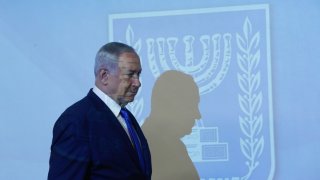Could the Gaza War Revitalize Nuclear Non-Proliferation in the Middle East?
In hindsight, there never was a perfect time to advance an arms treaty in the region.
In October 2023, an Israeli member of the Knesset for the Likud party, Revital “Tally” Gotliv, called for the Israeli military to use the “Jericho Missile” (ballistic missiles developed by Israel since the 1960s) and the “Doomsday” nuclear weapon against Hamas and Palestine. Israel’s then Heritage Minister Amihai Eliyahu suggested in a radio interview in November 2023 that Israel could drop an atomic bomb on Gaza, a point he later suggested was “metaphorical” before Prime Minister Netanyahu suspended him from cabinet meetings. Such loose talk about nuclear weapons use partially reflects President Putin’s comments about nuclear weapons use in Ukraine in 2022.
President Trump also struck a blow to nuclear non-proliferation through his unilateral withdrawal from the Joint Comprehensive Plan of Action (JCPOA) with Iran in 2018. He chose a “maximum pressure” policy instead, culminating in serious escalation in the Gulf up to 2021. In response to slow diplomatic progress with the Biden administration, Iran stopped implementing the Additional Protocol in 2021, which had given IAEA inspectors indefinite access to Iran’s facilities and nuclear materials. Iran further complicated its ongoing tacit nuclear negotiations with the United States in Oman by installing new advanced centrifuges.
Since the onset of the Gaza War, Israel has assassinated individuals such as Mohammad Reza Zahedi, the leader of the Quds Force in Lebanon and Syria; Mohammad Srour, Hamas financier; Fuad Shukr, senior Hezbollah commander; and Ismail Haniyeh, Hamas’ political leader. The Israeli military began bombing Hezbollah targets in southern Lebanon on August 25, and Hezbollah quickly responded with an aerial attack against Israeli military and aerial defense bases. Israel continues to launch large-scale raids in the West Bank. Although escalation may not lead to an all-out war with Hezbollah and Iran for reasons of self-preservation, the conflict’s current trajectory may give Iran many more reasons to attain a nuclear deterrent to challenge Israel’s deterrent power better.
This will put nuclear diplomacy with Iran firmly back on the table. Nonetheless, should Kamala Harris become the next U.S. president, it will require heavy political lifting from the United States.
Ongoing regional escalation is not the only driver for preventative diplomacy in this area. The need for enhanced regulation and the protection of nascent civil nuclear facilities in the Middle East makes a pan-regional nuclear weapons agreement urgent. Certainly, there have been significant obstacles to the realization of a Weapons of Mass Destruction Free Zone in the Middle East (WMDFZME), including sequencing problems between Israel and Egypt. In response, the United States has advanced normalization agreements with Israel under the Abraham Accords instead of adhering to the tenets of a 2002 Arab Peace Initiative that could have guaranteed normalization with all members of the Arab League. In hindsight, the perfect time to advance an arms treaty in the region has been proven not to exist.
In the context of regional escalation and with support from progressives in the Democratic party, a Harris administration might be better placed to talk openly about the Israeli nuclear deterrent and engage the Israeli public in a policy rethink. To attract support from the American Jewish community and the Congressional Jewish Caucus in particular, the White House could offer the Israeli government a cast-iron security guarantee in the form of a U.S. nuclear umbrella, which would build on an offer of U.S. defense to Israel given by Secretary of Defense Lloyd Austin in July 2024.
After Iran and others commit to ceasing and reversing their nuclear weapons-related activities, a combination of assurances with a U.S. security guarantee could lead Israel to decommission its approximately ninety nuclear warheads and sign up for a WMDFZME.
Former Israeli military chiefs of staff and Mossad directors have already warned of the “existential threat” that Netanyahu’s policies present to the State of Israel. Its nuclear weapons are, at best, of questionable value against an Iranian leadership that has learned from Israel’s pre-emptive strike on the Osirak reactor in Iraq on June 9, 1981, and against a suspected North Korean-built nuclear reactor in Syria in 2007, by locating its nuclear reactors around the country and fortifying them underground. Former Israeli Prime Minister Naftali Bennett has already gone on record saying U.S. unilateral withdrawal from the JCPOA was a mistake since Iran has made more progress in its nuclear program than at any time before. This response suggests that a diplomatic solution continues to be the best option.
Israel’s inclusion in a WMDFZME framework would unlock key aspects of Levantine and Gulf nuclear non-proliferation and a significant portion of regional insecurity by bringing Israel and Iran into an equitable nuclear arrangement, preempting further devastating kinetic military action and nuclear weapons use, as well as nuclear-related accidents and terrorism concerns.
Dr. Robert Mason is a Non-Resident Fellow with the Arab Gulf States Institute in Washington.
Image: Gil Cohen Magen / Shutterstock.com.

